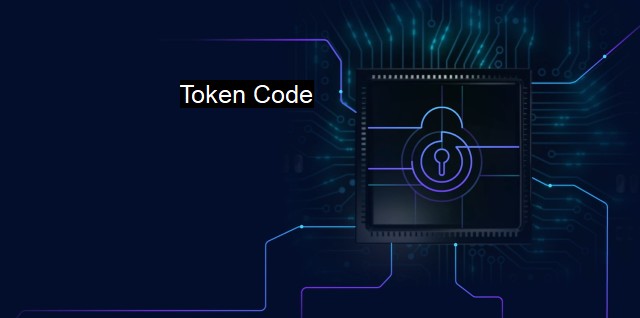What is Token Code?
Understanding Token Codes: The Key to Two-Factor Authentication and Cybersecurity
The cybersecurity landscape is becoming increasingly complicated with the advent of numerous new technologies being developed every day. One of the concepts permeating the cybersecurity industry is termed as "Token Code". This particular component, deeply embedded in the kosmos of cybersecurity across numerous fields, warrants a considerable discussion owing to its vital implications for securing information infrastructure and networks.The concept of "Token Code" pertains to a part of a digital signature – an encrypted facet of data – that is created in the process of authentication and typically forms a key underpinning of two-factor authentication systems. Two-factor authentication (2FA) is a field in cybersecurity that works to ensure an elevated layer of protection for critical events and transactions surrounding sensitive and significant data.
Token codes are typically created using the Secure Hash Algorithm, ensuring that they offer a robust guarantee of security. As their name indicates, token codes serve as a token or a representation of digital signatures for a more enhanced level of authentication and approval.
Each token code denotes a distinct identifier, functioning as an interim to complete the process of login or access to a specified system. Compared to a standard password that remains static, token codes are dynamic. These highly secure methods of authentication are often time-sensitive – they are only active for a short, predefined interval and become obsolete as soon as the window expires, reducing the risk of unauthorized access.
Token codes are typically used in antivirus programs to combat potential cybersecurity threats, warding against potential attacks more effectively. Antivirus applications serve as dynamic arsenals against the menacing threats that engender vulnerabilities for important networks and data frameworks. Token codes serve as one of the core tools integrated into these antivirus programs, working towards ensuring a more sound, secure, and resilient cybersecurity framework.
In the face of sophisticated threats that can steal passwords, the token code proves beneficial by rendering the stolen information useless. Given that token systems generate new codes in stipulated time spans, intercepted or stolen tokens would no longer be pertinent.
Token codes prove vital in various stages of encryption, decryption, and the alteration of original data to make it unreadable - a key function of antiviruses known as data obfuscation. Token codes thus fortify the protection offered by antivirus systems. They deter unauthorized access, debilitating the potential for attacks, and bolstering cybersecurity frameworks.
While token codes form an integral part of preserving integrity of systems and data, and in effectively combating potential threats through antivirus actions, it's worth mentioning that this tool is efficient when used in conjunction with other cybersecurity measures. Other strategies working symbiotically with token codes include the use of strong passwords, vigilance against phishing attacks, and regular data backups, to name a few.
Investments in cybersecurity are escalating around the world as societies digitalize and thus become more susceptible to cyber threats. Token codes unfold as one of the sterling measures in this new world of increasing cybersecurity threats. Despite their robust facets that make them a commendable device for data protection, token codes are however reliant on diligent use by employees, users, and network administrators. This calls for ongoing training and awareness campaigns to ensure that these tools are used correctly, which will potentially galvanize the overall cybersecurity framework.
In sum, Token Codes are integral in establishing multi-layered protection systems against evolving and complex cyber threats. Their deployment in many critical security processes, from antivirus applications to authentication schemas, underscores just how central this integral cybersecurity tool has become in securing our digital assets.

Token Code FAQs
What is a token code in cybersecurity?
A token code in cybersecurity is a unique code or password that is used to authenticate a user's identity.How is a token code different from a regular password?
A token code is different from a regular password in that it is generated dynamically and is only valid for a limited period of time. This makes it more difficult for hackers to steal or guess the authentication code, and adds an extra layer of security to a system.How is a token code used in antivirus software?
In antivirus software, a token code can be used to verify that the user has a valid subscription or license for the software. The antivirus program will generate a code that the user must enter to activate or renew their subscription. This helps to prevent unauthorized access, and ensures that the software is being used by legitimate users.Can a token code be hacked or stolen?
While it is possible for a token code to be hacked or stolen, it is generally considered to be more secure than a regular password. This is because the codes are generated dynamically, and are only valid for a short period of time. Additionally, many systems require a user to have both a token code and a regular password to access sensitive information, adding an extra layer of security. However, it is still important to be careful with your token code and to follow best practices for cybersecurity, such as not sharing your code with others or using it on public computers.| | A | | | B | | | C | | | D | | | E | | | F | | | G | | | H | | | I | | | J | | | K | | | L | | | M | |
| | N | | | O | | | P | | | Q | | | R | | | S | | | T | | | U | | | V | | | W | | | X | | | Y | | | Z | |
| | 1 | | | 2 | | | 3 | | | 4 | | | 7 | | | 8 | | |||||||